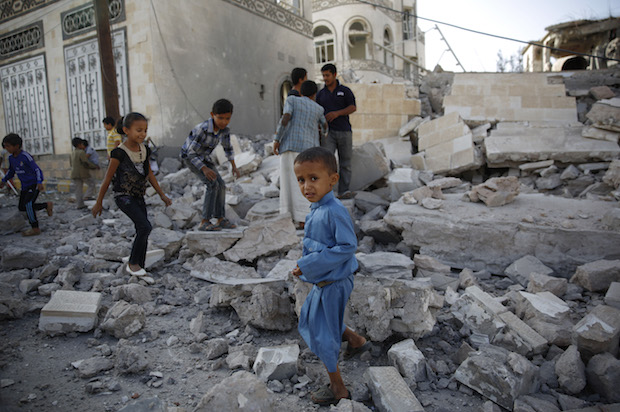Warplanes from the U.S.-armed Saudi-led coalition bombed a family’s house in southern Yemen on Wednesday, killing 11 members of a family, including four children, security officials and witnesses say.
Yemeni officials told AP that the warplane, which is believed to belong to the UAE, fired two missiles at the family’s home in the town of el-Mahala, in Yemen’s southern province of Lahij.
The house was flattened, the officials said. Only one child from the family survived the attack.
Witness Ahmed Hadash recalled hearing explosions for 40 minutes while the warplanes flew overhead.
“The bodies were distorted and the human remains were everywhere,” the witness said.
Another suspected Saudi-led coalition airstrike hit a mineral water factory in the same Lahij province on Wednesday, security officials said. No causalities were reported in this attack.
Since March 2015, a coalition of Middle Eastern nations armed and backed by the U.S. and the U.K. has waged a brutal war in Yemen, the poorest country in the Middle East.
American and British military officials are physically in the room with Saudi bombers, with whom they share intelligence, and have access to a list of targets.
In its fight against Houthi rebels and militants loyal to former President Ali Abdullah Saleh, the Saudi-led coalition has bombed civilian areas, including hospitals, schools, residential neighborhoods, weddings, a refugee camp and more, leading human rights organizations to accuse the Western-backed coalition of war crimes.
More than 8,100 people have been killed in Yemen in the war. The U.N. has said the Western-backed coalition is responsible for two-thirds of civilian casualties.
A March report by UNICEF found that an average of six Yemeni children have been killed or injured every day for the past 12 months in the war.
Wednesday’s attack in the Lahij province comes just days after Amnesty International released a report on the cluster bomb “minefields” that are killing children in Yemen.
Amnesty has documented the use of six types of cluster munitions in Yemen by Western-backed coalition forces. These weapons, which are banned by more than 100 countries, were manufactured by the U.S., U.K. and Brazil.
The Saudi-led coalition has dropped U.S.-made cluster bombs on civilian areas in Yemen, according to Human Rights Watch.
After the attack on Wednesday, Naser al-Khoubeigi, the governor of Lahij, called on the Yemeni government and coalition to conduct an investigation.
Al-Khoubeigi denied that there was any communications between local authorities and the coalition.
“We know nothing about the attack,” he said. “The coalition conducts attacks without informing us. The responsibility of this operation is on those who provide the coalition with the wrong coordinates.”
“Security officials claim that the Saudi-led coalition regularly conducts unreported strikes and has detained many people, claiming that they are members of al-Qaida or the local Islamic State group affiliate,” AP reported.
News outlets such as BBC, however, have found evidence that Western-backed, Saudi-led coalition forces and al-Qaeda militants actually both fought Houthi rebels in a key battle.
On the frontline near the city of Taiz, documentary filmmaker Safa al-Ahmad filmed extremist al-Qaeda militants collaborating with UAE-supported fighters who back the pro-Saudi Yemeni government.
Al-Ahmad said she was told the Western-backed coalition fighters were working with Ansar al-Sharia, an affiliate of al-Qaeda in the Arabian Peninsula, or AQAP, one of the most brutal branches of the extremist group.
The coalition denies cooperating with Sunni extremists who are opposed to the Houthis, but the Houthis say the coalition is more interested in defeating them — whom the coalition accuses, without evidence, of being tools of Iran — than with defeating al-Qaeda.
A renowned Middle East journalist warned in a recent column that AQAP was the ultimate winner of the disastrous U.S.-backed Saudi war in Yemen, describing it as “Iraq all over again.”
In early May, the Obama administration quietly deployed troops to Yemen. The Pentagon says it sent in a “very small number” of U.S. forces to help fight al-Qaeda, which was strengthened by the war it backed.

